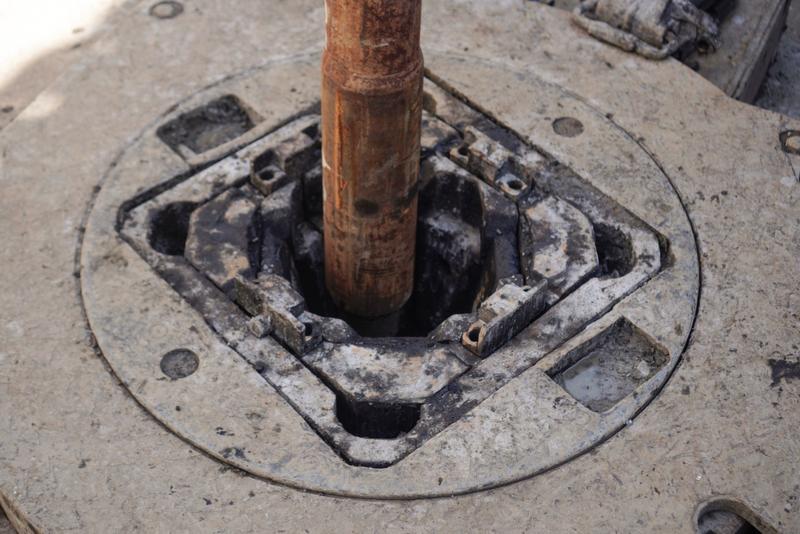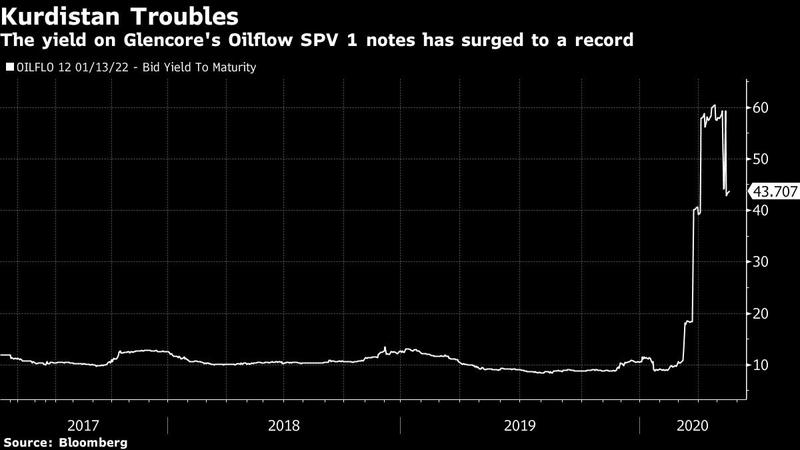 Pipework is positioned on the oil drilling platform at the oil and gas field processing and drilling site operated by Ukrnafta PJSC in Boryslav, Lviv region, Ukraine, on July 4, 2019. Ukrnafta co-owner, Naftogaz JSC, the largest gas supplier in the country of 42 million people, is seeking funds to accelerate gas purchases ahead of the heating season and a potential disruption of gas transit by Russia’s Gazprom PJSC from the start of 2020. (VINCENT MUNDY / BLOOMBERG)
Pipework is positioned on the oil drilling platform at the oil and gas field processing and drilling site operated by Ukrnafta PJSC in Boryslav, Lviv region, Ukraine, on July 4, 2019. Ukrnafta co-owner, Naftogaz JSC, the largest gas supplier in the country of 42 million people, is seeking funds to accelerate gas purchases ahead of the heating season and a potential disruption of gas transit by Russia’s Gazprom PJSC from the start of 2020. (VINCENT MUNDY / BLOOMBERG)
Some of the world’s poorest oil-producing countries are slipping behind on payments for billions of dollars in oil-for-cash loans from commodity trading houses, putting them at risk of default.
The so-called prepayment deals, in which a trading house advances a nation money to be repaid with future oil shipments, have been popular among some African and Middle East oil nations as the only way to raise funds. But they have also proved controversial: in some cases they create an opaque source of debt that governments find hard to pay back when oil prices plunge.
As the loans are repaid with cargoes of oil, when the market price plunges, countries need to divert more barrels to keep up with the payments
The Kurdistan region of northern Iraq is now struggling to repay a US$500 million loan from commodity giant Glencore Plc, according to documents reviewed by Bloomberg News. Glencore and rival trader Trafigura Group Ltd. are also in talks to restructure oil-for-cash loans of about US$1.5 billion with the Republic of Congo, according to people familiar with the matter. And Chad, one of the poorest countries in the world, is using a clause in its oil-for-cash contract worth more than US$1 billion to reduce payments.

Global Witness, a non-governmental organization, has called the loans a “gamble on the future oil price”, warning countries that they can become an “open-ended liability for future governments and generations.”
As the loans are repaid with cargoes of oil, when the market price plunges, countries need to divert more barrels to keep up with the payments. In a worst-case situation, like in 2016 for Chad, it could mean devoting a country’s entire petroleum output to repaying the loans.
Offloading Risk
While commodity traders thrive on price volatility, rather than on whether prices are high or low, they are also exposed to declines in commodity prices through these loans.
In most cases, they offload the risk by syndicating the loans to banks, buying credit insurance, and -- in at least one case -- selling notes to institutional investors like pension funds. That would mean losses elsewhere in the financial system if the deals are restructured.
ALSO READ: UAE sees no immediate risk to oil flow via Strait of Hormuz
Glencore and Trafigura declined to comment. A representative of the Kurdish oil ministry didn’t respond to request for comments. The government of the Republic of Congo declined to comment.
Oil prices have collapsed this year after dozens of countries closed their economies in an effort to stop the spread of coronavirus, sharply reducing energy demand. The crash was compounded by a price war between Saudi Arabia and Russia that eventually lead to negative prices.
In the case of Kurdistan, global investors including US pension funds are on the hook for potential losses as they bought US$500 million worth of five-year notes known as Oilflow SPV 1 DAC linked to the loans. Glencore has told noteholders that it would soon present “a formal proposal” to restructure the deal, according to a notice posted on the Cayman Islands Stock Exchange.
The value of the Oilflow SPV 1 notes has plunged because of the potential restructuring, trading recently at about 80 cents on the dollar, according to data compiled by Bloomberg. That implies a yield of more than 40 percent. They originally offered 12 percent.
Chad told the International Monetary Fund that it plans to repay an oil loan of more than US$1 billion from a Glencore-led syndicate more slowly than anticipated, using a clause in the contract that allows it to reduce payments when prices drop below US$42 a barrel. Brent crude is trading at around US$35.
Chad has already restructured the loans with the Glencore-led syndicate twice since they were first subscribed in 2013. At the end of 2019, the African country owed the trading house directly US$379 million, and another US$778 million to syndicate banks.
READ MORE: European shares rise on economic awakening; oil and gold jump
Republic of Congo has been trying to restructure its oil-for-cash loans for nearly a year, but a tentative deal reached in late 2019 was derailed after prices crashed. The African nation is now in fresh talks with Trafigura and Glencore. The traders are negotiating with Congo about extending the maturity of the loans, according to one person familiar with the matter.


